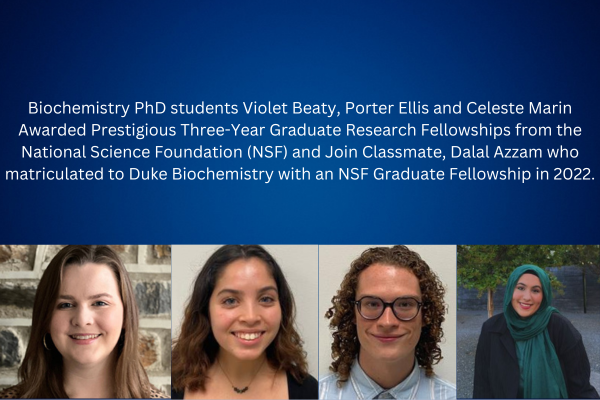
Biochemistry PhD students Violet Beaty, Porter Ellis and Celeste Marin have been awarded prestigious three-year Graduate Research Fellowships from the National Science Foundation (NSF) and join classmate, Dalal Azzam, who matriculated to Duke Biochemistry with an NSF Graduate Fellowship in 2022. This award financially supports outstanding graduate students in NSF-supported STEM disciplines. Past recipients have contributed to research, teaching, and innovation in their areas of expertise; whilst the fellowship recognition has helped them become successful leaders in their academic and professional careers. Provided below are brief descriptions of the projects and potential outcomes on which each of these students is working.

Dalal Azzam, a second-year graduate student in the laboratory of Lorena Beese:
Appreciating the mechanistic underlays of protein-DNA interactions helps us understand the complex mechanisms that govern biological function. The interdisciplinary approach combining biochemistry with structural biology provides a multi-dimensional look into the science at the core of all life. Through this project, I am excited to expand our collective understanding of DNA-protein interactions, contribute high-resolution structures of key regulatory complexes, and elucidate how faults in these interactions promote catastrophic downstream misregulations.

Violet Beaty, a second-year graduate student in the laboratory of Shuo Han:
The human microbiota contains diverse bacterial phyla, encompassing remarkable genetic and metabolic diversity. While the gut microbiota contributes to age-associated physiology in its host organisms, we do not yet understand which gut bacterial species within the community promote healthy aging. Furthermore, it is unknown how these bacterial and host metabolic pathways play a role in longevity. My work aims to understand gut bacterial signals which modulate host aging and physiology.

Porter Ellis, a second-year graduate student in the laboratory of Maria Schumacher:
In prokaryotes, i.e., bacteria, nucleoid associated proteins, or NAPs, support the compaction and organization of genomic DNA. Emerging evidence highlights the importance of NAPs in fundamental biological processes, including gene regulation, virulence, and stress responses. However, there is currently little information available on the mechanisms by which many NAPs interact with DNA and function in regulatory processes. Thus, to better understand these NAP functions, my research focusses on the structural interrogation of a novel NAP and its interactions with key biological partners.

Celeste Marin, a second-year graduate student in the laboratory of Christopher Nicchitta:
Routine transcriptional and post-transcriptional processes are altered significantly under stress conditions, and how these events unfold is critical for cell survival. However, it remains unknown how the regulatory processes coupled to mRNA export are influenced under stress. Through my research I shall leverage optical imaging techniques to probe mRNA trafficking dynamics under stress and further our understanding of these fundamental regulatory process